Gwendolyn Brown, contralto
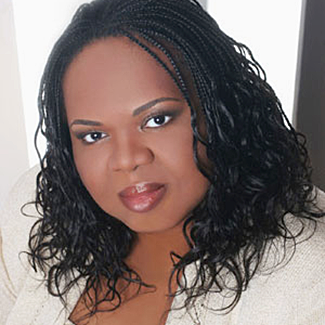
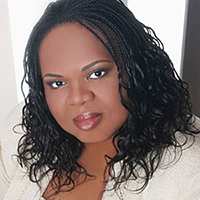
Contralto Gwendolyn Brown’s operatic performances of traditional, 20th century, American Art Song, Negro Spiritual and even the avant-garde has earned her consistent critical acclaim. Gwendolyn Brown’s “deep contralto “showed astonishing range and timbre, a stern voice of certainty.” (Huddersfield Examiner) and she is hailed as “a transfixing force of nature” (Mark Swed, LA Times).
Ms. Brown’s recent performances in George Lewis’s new opera Afterword: The AACM (as) Opera were met with critical acclaim in the US and abroad. Other critically acclaimed highlights of contemporary works include creating the lead role of Marie Laveau, in Ann LeBaron’s Crescent City for Los Angeles’ The Industry.
Ms. Brown has performed for many of the top opera companies and orchestras throughout the United States as well as in Australia, Germany, Italy, Spain, Amsterdam and Brussels. She has received critical acclaim in character roles including the Principessa in Suor Angelica and Zita in Gianni Schicci. She has performed her signature role of Maria in Porgy and Bess with the Lyric Opera of Chicago, Seattle Opera, Boston Symphony Orchestra, Toronto Symphony Orchestra, and Washington National Opera as well as in Germany, Amsterdam, Brussels and recently for the Sydney Symphony Orchestra.
Originally from Memphis, TN, Gwendolyn Brown studied music at Fisk University, the University of Memphis and the American Conservatory of Music. She participated in the young artist programs of Des Moines Metro Opera and Lyric Opera of Chicago Center for American Artists.
Ms. Brown is Assistant Professor of Music at her alma mater Fisk University.
Graham Haynes, cornet and flugelhorn
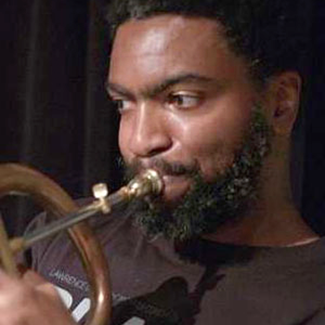
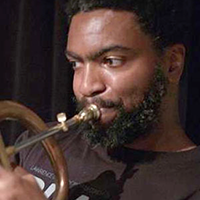 Graham Haynes is an American cornetist, trumpeter and composer. The son of jazz drummer Roy Haynes,[1] Graham is known for his work in nu jazz, fusing jazz with elements of hip hop and electronic music.
Graham Haynes is an American cornetist, trumpeter and composer. The son of jazz drummer Roy Haynes,[1] Graham is known for his work in nu jazz, fusing jazz with elements of hip hop and electronic music.
With aspirations to push jazz beyond its traditional boundaries, Graham Haynes’ first foray into electronic music came in 1979 upon meeting alto saxophonist Steve Coleman. Together, they formed a band called Five Elements, which launched an influential group of improvisers called M-Base Collective. After the formation of his own ensemble – Graham Haynes and No Image – and the subsequent release of an album (What Time It Be?), Haynes would spend the balance of the 1980s studying a wide range of African, Arabic and South Asian Music. After a move to France in 1990, Haynes incorporated these far-off influences into his next two releases – Nocturne Parisian and Griot’s Footsteps.
Helga Davis, soprano
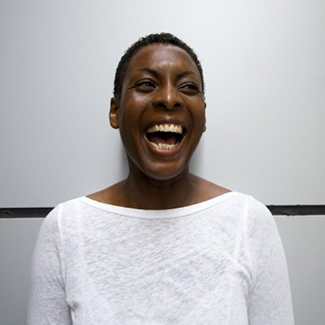
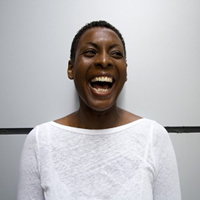 Helga Davis served as a principle actor in the 25th-anniversary international revival of Robert Wilson and Philip Glass’s seminal opera Einstein on the Beach. Her appearance in You Us We All by Shara Nova (My Brightest Diamond) and Andrew Ondrejcak marked her fifth at the Brooklyn Academy of Music’s Next Wave Festival.
Helga Davis served as a principle actor in the 25th-anniversary international revival of Robert Wilson and Philip Glass’s seminal opera Einstein on the Beach. Her appearance in You Us We All by Shara Nova (My Brightest Diamond) and Andrew Ondrejcak marked her fifth at the Brooklyn Academy of Music’s Next Wave Festival.
Among the many works written for her are Faust’s Box, written and directed by acclaimed Italian contemporary music composer Andrea Liberovici; Oceanic Verses by Paola Prestini, with libretto by Donna DiNovelli and video by Ali Houssani; Elsewhere by Missy Mazzoplli and Maya Beiser; and The Blue Planet, a multi-media theater piece written by Peter Greenaway and directed by Saskia Boddeke. She was also the co-star of The Temptation of St. Anthony directed by Robert Wilson, with libretto and score by Bernice Johnson Reagon of Sweet Honey in the Rock.
Mark Shim, tenor saxophone
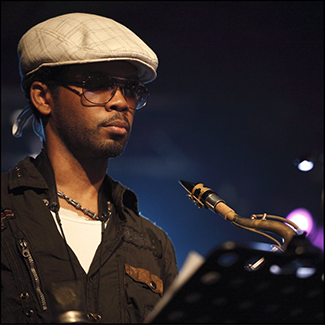
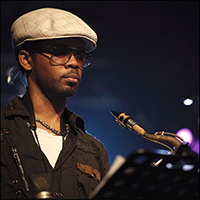
Born in Kingston, Jamaica, saxophonist Mark Shim moved to Canada then later settled in Richmond, Virginia. He started on saxophone in seventh grade, graduating from high school in 1991 and attending Virginia Commonwealth University and William Paterson College. In 1994 he moved to Brooklyn, where he played and recorded with Hamiett Bluiett in Harlem. He then played with Mose Allison, Betty Carter, Greg Osby, and the Mingus Big Band.
Shim’s debut recording Mind Over Matter (Blue Note, 1998) was followed by New Directions , a young group project, that included Osby, Jason Moran, and Stefon Harris and then his second recording as a leader, the outstanding Turbulent Flow, both released on Blue Note in 2000.
With a unique deep timbre and chops that range from swinging bop, uncut funk, to avant-garde, Shim continues to perform, record, and tour with artists such as Delfeayo Marsalis, Carmen Lundy, The Headhunters, Michele Rosewoman, Liberty Ellman, and Steve Lehman.
Roscoe Mitchell, winds
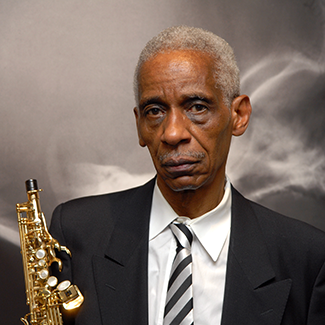
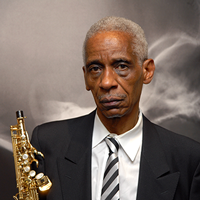 Internationally renowned musician, composer, and innovator, began his distinguished career in the spirited 1960s of Chicago, Illinois. His role in the resurrection of long neglected woodwind instruments of extreme register, his innovation as a solo woodwind performer, his and his reassertion of the composer into what has traditionally been an improvisational form have placed him at the forefront of contemporary music for over four decades. A leader in the field of avant-garde jazz and contemporary music, Mr. Mitchell is a founding member of the world renowned Art Ensemble of Chicago, the Association for the Advancement of Creative Musicians, and the Trio Space.
Internationally renowned musician, composer, and innovator, began his distinguished career in the spirited 1960s of Chicago, Illinois. His role in the resurrection of long neglected woodwind instruments of extreme register, his innovation as a solo woodwind performer, his and his reassertion of the composer into what has traditionally been an improvisational form have placed him at the forefront of contemporary music for over four decades. A leader in the field of avant-garde jazz and contemporary music, Mr. Mitchell is a founding member of the world renowned Art Ensemble of Chicago, the Association for the Advancement of Creative Musicians, and the Trio Space.
Muhal Richard Abrams, piano
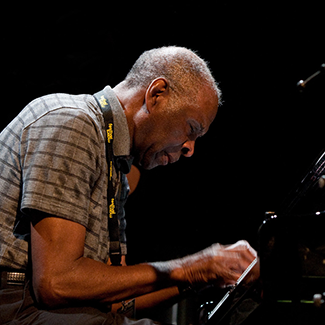
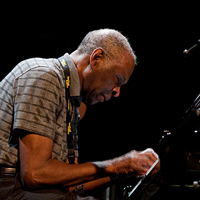 Muhal Richard Abrams has been in the forefront of the contemporary music scene for well over forty years. Muhal is a co-founder of The Association for the Advancement of Creative Musicians (AACM), founder of The AACM School of Music and President of The Association for the Advancement of Creative Musicians, New York City Chapter. Muhal was the first recipient of the grand international jazz award, “The Jazzpar Prize”, which was awarded to him in 1990 by the Danish Jazz Center in Copenhagen, Denmark.. In 1999 Muhal was presented a proclamation by Richard M. Daley, Mayor of the City of Chicago, declaring April 11, 1999 as Muhal Richard Abrams Day in Chicago.
Muhal Richard Abrams has been in the forefront of the contemporary music scene for well over forty years. Muhal is a co-founder of The Association for the Advancement of Creative Musicians (AACM), founder of The AACM School of Music and President of The Association for the Advancement of Creative Musicians, New York City Chapter. Muhal was the first recipient of the grand international jazz award, “The Jazzpar Prize”, which was awarded to him in 1990 by the Danish Jazz Center in Copenhagen, Denmark.. In 1999 Muhal was presented a proclamation by Richard M. Daley, Mayor of the City of Chicago, declaring April 11, 1999 as Muhal Richard Abrams Day in Chicago.
Except for a brief period of study at Chicago Musical College and Governors State University in Chicago, Illinois where he studied electronic music, Mr. Abrams is predominately a self-taught musician who, as a result of many years of observation, analysis, and practice as a performing musician, has developed a highly respected command of a variety of musical styles both as a pianist and composer. The versatile Mr. Abrams and members of The AACM are responsible for some of the most original new music approaches of the last three decades.
Rudresh Mahanthappa, alto saxophone, composer
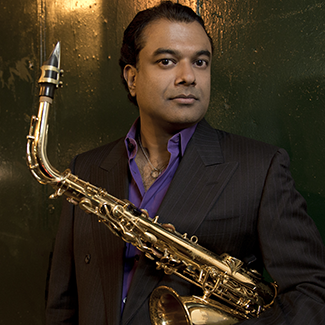
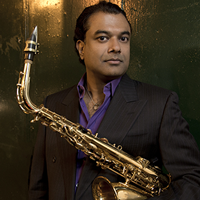 RUDRESH MAHANTHAPPA
RUDRESH MAHANTHAPPA
Few musicians share the ability of alto saxophonist/composer Rudresh Mahanthappa to embody the expansive possibilities of his music with his culture. What has materialized is a sound that hybridizes progressive jazz and South Indian classical music in a fluid and forward-looking form that reflects Mahanthappa’s own experience growing up a second-generation Indian-American. The current manifestations of that trajectory include his latest project Bird Calls (2015), which was named #1 album of the year by both Downbeat and NPR Music’s Jazz Critics Poll.
Hailed by the New York Times as possessing “a roving intellect and a bladelike articulation,” Mahanthappa has been awarded a Guggenheim Fellowship, a New York Foundation for the Arts Fellowship, and commissions from the Rockefeller Foundation MAP Fund, Chamber Music America and the American Composers Forum. He has been named alto saxophonist of the year for three years running in Downbeat Magazine’s International Critics’ Polls (2011-2013) and again in 2015 and 2016, and for five years running by the Jazz Journalists’ Association (2009-2013) and again in 2016. He won alto saxophonist of the year in the 2016 JazzTimes Magazine Critics’ Poll. In April 2013, he received a Doris Duke Performing Artist Award, one of the most prominent arts awards in the world. In 2015, he was named a United States Artists Fellow. In 2016, he was named the Director of Jazz and the Associate Director of the Program in Musical Performance at Princeton University.
Mahanthappa is a Yamaha artist and uses Vandoren reeds exclusively.
RUDRESH MAHANTHAPPA SOCIAL MEDIA LINKS
WEBSITE:
http://rudreshm.com/
ACT RECORDS WEBSITE PAGE (HI RES PHOTOS/EPK):
https://www.actmusic.com/en/Artists/Rudresh-Mahanthappa
https://www.actmusic.com/en/Artists/Rudresh-Mahanthappa/(presse)/20319
YOUTUBE:
http://www.youtube.com/rudreshm
TWITTER:
https://twitter.com/rudreshm
FACEBOOK:
https://www.facebook.com/rudreshm
Jen Shyu, performer/composer
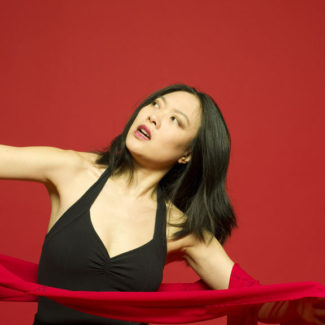
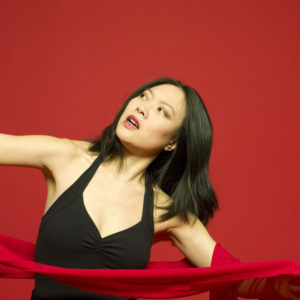 Born from Taiwanese and East Timorese immigrant parents, 2016 Doris Duke Artist Jen Shyu (Chinese name: 徐秋雁) is an experimental jazz vocalist, composer, multi-instrumentalist, dancer, producer, and Fulbright scholar. Known mostly for her virtuosic singing with saxophonist and 2014 MacArthur Genius Fellow Steve Coleman since 2003 and having collaborated with innovators Anthony Braxton, Bobby Previte, Chris Potter, Michael Formanek, and David Binney to name a few, she has performed her own music around the world in such venues as Carnegie Hall, Lincoln Center, Brooklyn Academy of Music, Metropolitan Museum of Art, Rubin Museum of Art, Ringling International Arts Festival, Asia Society, Roulette, Blue Note, Bimhuis, Salihara Theater, National Gugak Center, and National Theater of Korea and festivals around the world.
Born from Taiwanese and East Timorese immigrant parents, 2016 Doris Duke Artist Jen Shyu (Chinese name: 徐秋雁) is an experimental jazz vocalist, composer, multi-instrumentalist, dancer, producer, and Fulbright scholar. Known mostly for her virtuosic singing with saxophonist and 2014 MacArthur Genius Fellow Steve Coleman since 2003 and having collaborated with innovators Anthony Braxton, Bobby Previte, Chris Potter, Michael Formanek, and David Binney to name a few, she has performed her own music around the world in such venues as Carnegie Hall, Lincoln Center, Brooklyn Academy of Music, Metropolitan Museum of Art, Rubin Museum of Art, Ringling International Arts Festival, Asia Society, Roulette, Blue Note, Bimhuis, Salihara Theater, National Gugak Center, and National Theater of Korea and festivals around the world.
Vijay Iyer

 71st Ojai Music Festival: June 8-11, 2017
71st Ojai Music Festival: June 8-11, 2017
Grammy-nominated composer-pianist Vijay Iyer (pronounced “VID-jay EYE-yer”) was described by Pitchfork as “one of the most interesting and vital young pianists in jazz today,” by the Los Angeles Weekly as “a boundless and deeply important young star,” and by Minnesota Public Radio as “an American treasure.” He has been voted DownBeat Magazine‘s Artist of the Year three times – in 2016, 2015 and 2012. Iyer was named Downbeat’s 2014 Pianist of the Year, a 2013 MacArthur Fellow, and a 2012 Doris Duke Performing Artist. In 2014 he began a permanent appointment as the Franklin D. and Florence Rosenblatt Professor of the Arts in the Department of Music at Harvard University.
The New York Times observes, “There’s probably no frame wide enough to encompass the creative output of the pianist Vijay Iyer.” Iyer has released twenty albums covering remarkably diverse terrain, most recently for the ECM label. The latest include A Cosmic Rhythm With Each Stroke (2016), a collaboration with Iyer’s “hero, friend and teacher,” Wadada Leo Smith, which the Los Angeles Times calls “haunting, meditative and transportive”; Break Stuff (2015), with a coveted five-star rating in DownBeat Magazine, featuring the Vijay Iyer Trio, hailed by PopMatters as “the best band in jazz”; Mutations (2014), featuring Iyer’s music for piano, string quartet and electronics, which “extends and deepens his range… showing a delicate, shimmering, translucent side of his playing” (Chicago Tribune); and Radhe Radhe: Rites of Holi (2014), “his most challenging and impressive work, the scintillating score to a compelling film by Prashant Bhargava” (DownBeat), performed by International Contemporary Ensemble and released on DVD and BluRay.
George Lewis, composer
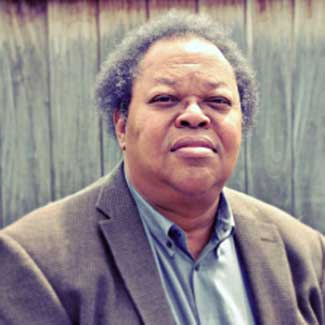

George E. Lewis is the Edwin H. Case Professor of American Music at Columbia University. A Fellow of the American Academy of Arts and Sciences and a Corresponding Fellow of the British Academy, Lewis’s other honors include a MacArthur Fellowship (2002), a Guggenheim Fellowship (2015), a United States Artists Walker Fellowship (2011), an Alpert Award in the Arts (1999), and fellowships from the National Endowment for the Arts.
Lewis studied composition with Muhal Richard Abrams at the AACM School of Music, and trombone with Dean Hey. A member of the Association for the Advancement of Creative Musicians (AACM) since 1971, Lewis’s work in electronic and computer music, computer-based multimedia installations, and notated and improvisative forms is documented on more than 150 recordings. His work has been presented by the BBC Scottish Symphony Orchestra, London Philharmonia Orchestra, Radio-Sinfonieorchester Stuttgart, Mivos Quartet, Boston Modern Orchestra Project, London Sinfonietta, Spektral Quartet, Talea Ensemble, Dinosaur Annex, Ensemble Pamplemousse, Wet Ink, Ensemble Erik Satie, Eco Ensemble, and others, with commissions from American Composers Orchestra, International Contemporary Ensemble, Harvestworks, Ensemble Either/Or, Orkestra Futura, Turning Point Ensemble, San Francisco Contemporary Music Players, 2010 Vancouver Cultural Olympiad, IRCAM, Glasgow Improvisers Orchestra, and others.
Lewis has served as Fromm Visiting Professor of Music, Harvard University; Ernest Bloch Visiting Professor of Music, University of California, Berkeley; Paul Fromm Composer in Residence, American Academy in Rome; Resident Scholar, Center for Disciplinary Innovation, University of Chicago; and CAC Fitt Artist in Residence, Brown University. Lewis received the 2012 SEAMUS Award from the Society for Electro-Acoustic Music in the United States, and his book, A Power Stronger Than Itself: The AACM and American Experimental Music (University of Chicago Press, 2008) received the American Book Award and the American Musicological Society’s Music in American Culture Award; Lewis was elected to Honorary Membership in the Society in 2016. Lewis is the co-editor of the two-volume Oxford Handbook of Critical Improvisation Studies (2016), and his opera Afterword (2015), commissioned by the Gray Center for Arts and Inquiry at the University of Chicago, has been performed in the United States, United Kingdom, and the Czech Republic. In 2015, Lewis received the degree of Doctor of Music (DMus, honoris causa) from the University of Edinburgh.
Read an interview with George Lewis on New Music Box >>
Visit George Lewis’ website >>
Photo credit: Emily Peragine
Brentano Quartet
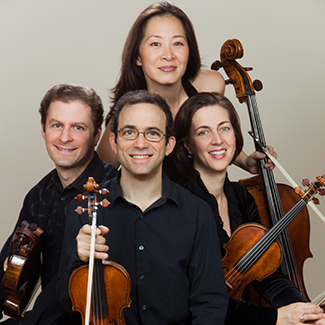
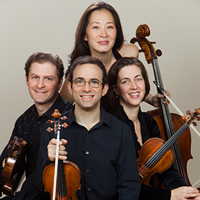 Since its inception in 1992, the Brentano Quartet has appeared throughout the world to popular and critical acclaim. “Passionate, uninhibited and spellbinding,” raves the London Independent; the New York Times extols its “luxuriously warm sound [and] yearning lyricism”; the Philadelphia Inquirer praises its “seemingly infallible instincts for finding the center of gravity in every phrase and musical gesture”; and the Times (London) opines, “the Brentanos are a magnificent string quartet…This was wonderful, selfless music-making.” Within a few years of its formation, the Quartet garnered the first Cleveland Quartet Award and the Naumburg Chamber Music Award; and in 1996 the Chamber Music Society of Lincoln Center invited them to be the inaugural members of Chamber Music Society Two, a program which was to become a coveted distinction for chamber groups and individuals. The Quartet had its first European tour in 1997, and was honored in the U.K. with the Royal Philharmonic Award for Most Outstanding Debut. That debut recital was at London’s Wigmore Hall, and the Quartet has continued its warm relationship with Wigmore, appearing there regularly and serving as the hall’s Quartet-in-residence in the 2000-01 season.
Since its inception in 1992, the Brentano Quartet has appeared throughout the world to popular and critical acclaim. “Passionate, uninhibited and spellbinding,” raves the London Independent; the New York Times extols its “luxuriously warm sound [and] yearning lyricism”; the Philadelphia Inquirer praises its “seemingly infallible instincts for finding the center of gravity in every phrase and musical gesture”; and the Times (London) opines, “the Brentanos are a magnificent string quartet…This was wonderful, selfless music-making.” Within a few years of its formation, the Quartet garnered the first Cleveland Quartet Award and the Naumburg Chamber Music Award; and in 1996 the Chamber Music Society of Lincoln Center invited them to be the inaugural members of Chamber Music Society Two, a program which was to become a coveted distinction for chamber groups and individuals. The Quartet had its first European tour in 1997, and was honored in the U.K. with the Royal Philharmonic Award for Most Outstanding Debut. That debut recital was at London’s Wigmore Hall, and the Quartet has continued its warm relationship with Wigmore, appearing there regularly and serving as the hall’s Quartet-in-residence in the 2000-01 season.
Cliff Colnot, conductor
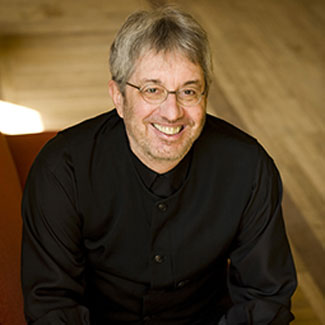
 In the past decade Cliff Colnot has emerged as a distinguished conductor and a musician of uncommon range. One of few musicians to have studied orchestral repertoire with Daniel Barenboim, Colnot has served as assistant conductor for Barenboim’s West-Eastern Divan Workshops for young musicians from Israel, Egypt, Syria, and other Middle Eastern countries. Colnot has also worked extensively with the late Pierre Boulez and served as assistant conductor to Boulez at the Lucerne Festival Academy. He regularly conducts the International Contemporary Ensemble (ICE), with whom he recorded Richard Wernick’s The Name of the Game for Bridge Records, and he collaborates with the internationally acclaimed contemporary music ensemble eighth blackbird.
In the past decade Cliff Colnot has emerged as a distinguished conductor and a musician of uncommon range. One of few musicians to have studied orchestral repertoire with Daniel Barenboim, Colnot has served as assistant conductor for Barenboim’s West-Eastern Divan Workshops for young musicians from Israel, Egypt, Syria, and other Middle Eastern countries. Colnot has also worked extensively with the late Pierre Boulez and served as assistant conductor to Boulez at the Lucerne Festival Academy. He regularly conducts the International Contemporary Ensemble (ICE), with whom he recorded Richard Wernick’s The Name of the Game for Bridge Records, and he collaborates with the internationally acclaimed contemporary music ensemble eighth blackbird.
Stephan Crump, bass
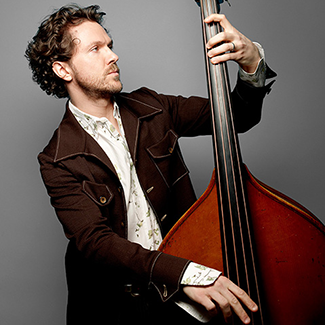
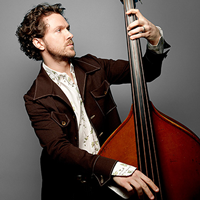 Memphis-bred, Grammy-nominated bassist/composer Stephan Crump has lived in Brooklyn since 1994. An active bandleader and composer, he has released ten critically-acclaimed albums in addition to numerous film scoring contributions. As bassist, known for transforming his instrument into a speaking entity of magnetic pull, his focus on creative instrumental music has led to collaborations with many of the leading lights of his generation.
Memphis-bred, Grammy-nominated bassist/composer Stephan Crump has lived in Brooklyn since 1994. An active bandleader and composer, he has released ten critically-acclaimed albums in addition to numerous film scoring contributions. As bassist, known for transforming his instrument into a speaking entity of magnetic pull, his focus on creative instrumental music has led to collaborations with many of the leading lights of his generation.
Shunning barriers of genre, Crump has performed and recorded with a diverse range of musicians, from Portishead’s Dave McDonald, The Violent Femmes’ Gordon Gano, to Patti Austin, Jim Campilongo, Jorma Kaukonen, Lucy Kaplansky, Big Ass Truck, Sonny Fortune, and late blues legend Johnny Clyde Copeland. Currently, he can be heard as a long-standing member of Vijay Iyer Trio and Sextet, Jen Chapin Band, Ches Smith Trio, Rez Abbasi Acoustic Quartet, Liberty Ellman Sextet, Secret Keeper (with Mary Halvorson), his own Rosetta Trio, as well as groups with Kris Davis, Ingrid Laubrock, Cory Smythe, Eric McPherson, Mat Maneri, and Okkyung Lee.
Sean Griffin, director
Sean Griffin lives and works in Los Angeles. Encompassing many languages, styles, media and forms, Griffin’s unique compositional works rely on interdisciplinary incongruities positioned at the intersection of sound, image, performance and the archive. His works manifest as music, large and small-scale operas, collaborative installations, complex numeric choreographies and historically weighted musical/performance works.
His works have been commissioned and presented internationally by venues including Los Angeles’ REDCAT, Armand Hammer Museum, and LACMA, June in Buffalo, Berlin’s Volksbühne, Secession Vienna, London’s Royal Academy and the Tate Modern, Festival d’Avignon, Taipei City Arts Festival, Walker Art Center, Centre Pompidou, and Festival BOM 2010 in Seoul, Korea, and EMPAC. He received an MFA from CalArts and a Ph.D. from the University of California, San Diego. He studied with Mel Powell, Chaya Czernowin and George Lewis.
Visit his website at http://seangriffin.org
Zakir Hussain, tabla player
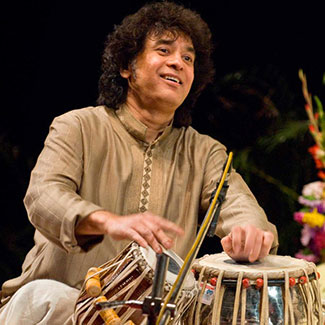
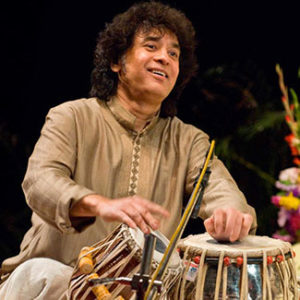 Zakir Hussain is today appreciated both in the field of percussion and in the music world at large as an international phenomenon. A classical tabla virtuoso of the highest order, his consistently brilliant and exciting performances have not only established him as a national treasure in his own country, India, but gained him worldwide fame. His playing is marked by uncanny intuition and masterful improvisational dexterity, founded in formidable knowledge and study. The favorite accompanist for many of India’s greatest classical musicians and dancers, he has not let his genius rest there. Widely considered a chief architect of the contemporary world music movement, Zakir’s contribution to world music has been unique, with many historic collaborations, including Shakti, which he founded with John McLaughlin and L. Shankar, Remember Shakti, the Diga Rhythm Band, Making Music, Planet Drum with Mickey Hart, Tabla Beat Science, Sangam with Charles Lloyd and Eric Harland and recordings and performances with artists as diverse as George Harrison, YoYo Ma, Joe Henderson, Van Morrison, Airto Moreira, Pharoah Sanders, Billy Cobham, Mark Morris, Rennie Harris, and the Kodo drummers. His music and extraordinary contribution to the music world were honored in April, 2009, with four widely-heralded and sold-out concerts at Carnegie Hall’s Artist Perspective series.
Zakir Hussain is today appreciated both in the field of percussion and in the music world at large as an international phenomenon. A classical tabla virtuoso of the highest order, his consistently brilliant and exciting performances have not only established him as a national treasure in his own country, India, but gained him worldwide fame. His playing is marked by uncanny intuition and masterful improvisational dexterity, founded in formidable knowledge and study. The favorite accompanist for many of India’s greatest classical musicians and dancers, he has not let his genius rest there. Widely considered a chief architect of the contemporary world music movement, Zakir’s contribution to world music has been unique, with many historic collaborations, including Shakti, which he founded with John McLaughlin and L. Shankar, Remember Shakti, the Diga Rhythm Band, Making Music, Planet Drum with Mickey Hart, Tabla Beat Science, Sangam with Charles Lloyd and Eric Harland and recordings and performances with artists as diverse as George Harrison, YoYo Ma, Joe Henderson, Van Morrison, Airto Moreira, Pharoah Sanders, Billy Cobham, Mark Morris, Rennie Harris, and the Kodo drummers. His music and extraordinary contribution to the music world were honored in April, 2009, with four widely-heralded and sold-out concerts at Carnegie Hall’s Artist Perspective series.
Visit his website at http://www.zakirhussain.com/
Photo: Susan Millman
International Contemporary Ensemble
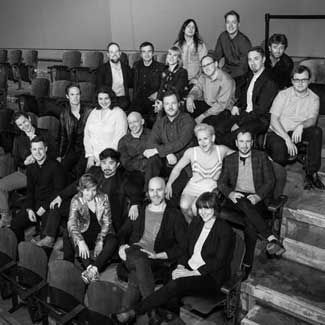
 The International Contemporary Ensemble (ICE), described by the New York Times as “one of the most accomplished and adventurous groups in new music,” is dedicated to reshaping the way music is created and experienced. With a modular makeup of 35 leading instrumentalists, performing in forces ranging from solos to large ensembles, ICE functions as performer, presenter, and educator, advancing the music of our time by developing innovative new works and new strategies for audience engagement. ICE redefines concert music as it brings together new work and new listeners in the 21st century.
The International Contemporary Ensemble (ICE), described by the New York Times as “one of the most accomplished and adventurous groups in new music,” is dedicated to reshaping the way music is created and experienced. With a modular makeup of 35 leading instrumentalists, performing in forces ranging from solos to large ensembles, ICE functions as performer, presenter, and educator, advancing the music of our time by developing innovative new works and new strategies for audience engagement. ICE redefines concert music as it brings together new work and new listeners in the 21st century.
Jennifer Koh, violin
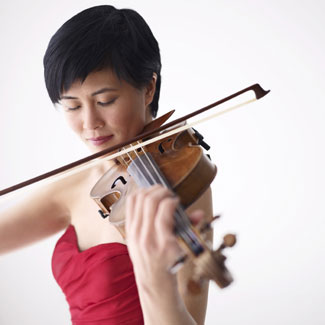
 Violinist Jennifer Koh is recognized for her intense, commanding performances, delivered with dazzling virtuosity and technical assurance. With an impassioned musical curiosity, she is forging an artistic path of her own devising, choosing works that both inspire and challenge. She is dedicated to performing the violin repertoire of all eras from traditional to contemporary, believing that the past and present form a continuum. She is also committed to exploring connections in the works she performs, searching for similarities of voice among diverse composers and associations within the works of a single composer. For her forward-thinking approach to classical music, presenting a broad and eclectic range of repertoire and fostering multidisciplinary collaborations with artists of all types and styles, Ms. Koh has been named Musical America’s 2016 Instrumentalist of the Year.
Violinist Jennifer Koh is recognized for her intense, commanding performances, delivered with dazzling virtuosity and technical assurance. With an impassioned musical curiosity, she is forging an artistic path of her own devising, choosing works that both inspire and challenge. She is dedicated to performing the violin repertoire of all eras from traditional to contemporary, believing that the past and present form a continuum. She is also committed to exploring connections in the works she performs, searching for similarities of voice among diverse composers and associations within the works of a single composer. For her forward-thinking approach to classical music, presenting a broad and eclectic range of repertoire and fostering multidisciplinary collaborations with artists of all types and styles, Ms. Koh has been named Musical America’s 2016 Instrumentalist of the Year.
Steve Lehman, saxophone
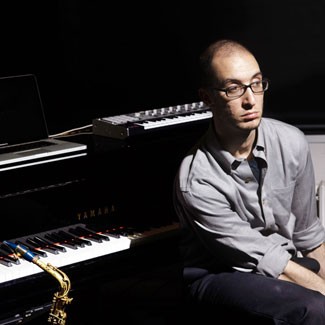

Described as “a state-of-the-art musical thinker” and a “dazzling saxophonist,” by The New York Times, Steve Lehman (b. New York City, 1978) is a composer, performer, educator, and scholar who works across a broad spectrum of experimental musical idioms. Lehman’s pieces for large orchestra and chamber ensembles have been performed by the International Contemporary Ensemble (ICE), So Percussion, Kammerensemble Neue Musik Berlin, the JACK Quartet, the PRISM Saxophone Quartet, and the Talea Ensemble. His recent recording, Mise en Abîme (Pi, 2014) was called the #1 Jazz Album of the year by NPR Music and The Los Angeles Times. And his previous recording, Travail, Transformation & Flow (Pi, 2009), was chosen as the #1 Jazz Album of the year by The New York Times.
Aruna Sairam, vocalist
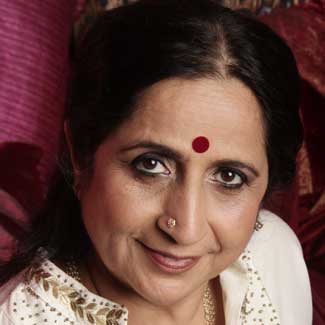
 Padma Shri Aruna Sairam, a renowned music ambassador of India, is one of the great classical music voices of India. Her style is rooted in tradition, yet continues to evolve. She belongs to the Veenai Dhanammal school of Carnatic music, known for its strict adherence to tradition and form. After her initial learning from her mother, who was a classical singer, Aruna, at the age of 10, became a disciple of the legendary T. Brinda. (T. Brinda is from the family of T. Balasaraswathi and T. Viswanathan—pioneers who brought South Indian classical music to the United States.) She was the first to introduce the Abhang, a distinctive folk music form from Western India, into a traditional Southern Indian Carnatic concert. She has also collaborated with leading musicians such as Dominique Vellard of France (classical liturgical, medieval, and Gregorian chants); Noureddine Tahiri of Morocco (Arabo-Andalusian music); Christian Bollmann of Germany (neo-classical music); Bollywood singer Shankar Mahadevan; mandolin virtuoso U.Srinivas, dancer Chandralekha; and multi-instrumentalist Ranjit Barot.
Padma Shri Aruna Sairam, a renowned music ambassador of India, is one of the great classical music voices of India. Her style is rooted in tradition, yet continues to evolve. She belongs to the Veenai Dhanammal school of Carnatic music, known for its strict adherence to tradition and form. After her initial learning from her mother, who was a classical singer, Aruna, at the age of 10, became a disciple of the legendary T. Brinda. (T. Brinda is from the family of T. Balasaraswathi and T. Viswanathan—pioneers who brought South Indian classical music to the United States.) She was the first to introduce the Abhang, a distinctive folk music form from Western India, into a traditional Southern Indian Carnatic concert. She has also collaborated with leading musicians such as Dominique Vellard of France (classical liturgical, medieval, and Gregorian chants); Noureddine Tahiri of Morocco (Arabo-Andalusian music); Christian Bollmann of Germany (neo-classical music); Bollywood singer Shankar Mahadevan; mandolin virtuoso U.Srinivas, dancer Chandralekha; and multi-instrumentalist Ranjit Barot.
Tyshawn Sorey, multi-instrumentalist and composer
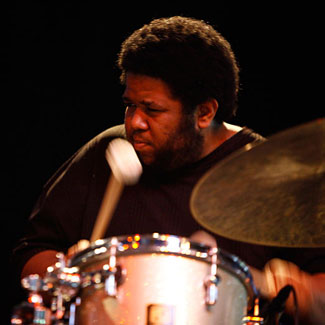
 Newark-born multi-instrumentalist and composer Tyshawn Sorey (b. 1980) is celebrated for his incomparable virtuosity, effortless mastery and memorization of highly complex scores, and extraordinary ability to blend composition and improvisation in his work. He has performed nationally and internationally with his own ensembles, as well as with such artists as John Zorn, Vijay Iyer, Roscoe Mitchell, Muhal Richard Abrams, Wadada Leo Smith, Marilyn Crispell, Steve Lehman, Evan Parker, and Myra Melford, among many others.
Newark-born multi-instrumentalist and composer Tyshawn Sorey (b. 1980) is celebrated for his incomparable virtuosity, effortless mastery and memorization of highly complex scores, and extraordinary ability to blend composition and improvisation in his work. He has performed nationally and internationally with his own ensembles, as well as with such artists as John Zorn, Vijay Iyer, Roscoe Mitchell, Muhal Richard Abrams, Wadada Leo Smith, Marilyn Crispell, Steve Lehman, Evan Parker, and Myra Melford, among many others.
Wadada Leo Smith, trumpet
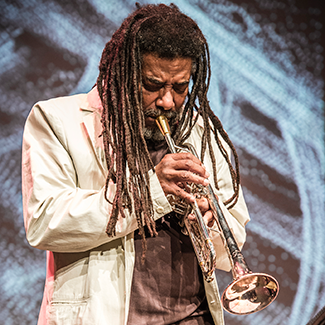
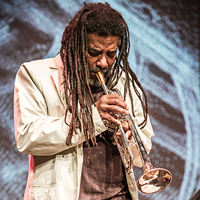 A trumpeter and multi-instrumentalist, composer, and improviser, Ishmael Wadada Leo Smith has been active in creative contemporary music for over forty years. His systemic music language Ankhrasmation is significant in his development as an artist and educator.
A trumpeter and multi-instrumentalist, composer, and improviser, Ishmael Wadada Leo Smith has been active in creative contemporary music for over forty years. His systemic music language Ankhrasmation is significant in his development as an artist and educator.
Born in Leland, Mississippi, Smith’s early musical life began in the high school concert and marching bands. At the age of thirteen, he became involved with the Delta Blues and Improvisation music traditions. He received his formal musical education with his stepfather Alex Wallace, the U.S. Military band program (1963), Sherwood School of Music (1967-69), and Wesleyan University (1975-76). Mr. Smith has studied a variety of music cultures: African, Japanese, Indonesian, European and American.
He has taught at the University of New Haven (1975-’76), the Creative Music Studio in Woodstock, NY (1975-’78), and Bard College (1987-’93). He is currently a faculty member at The Herb Alpert School of Music at California Institute of the Arts. He is the director of the African-American Improvisational Music program, and is a member of ASCAP, Chamber Music America, and the Association for the Advancement of Creative Musicians.
Steven Schick, conductor
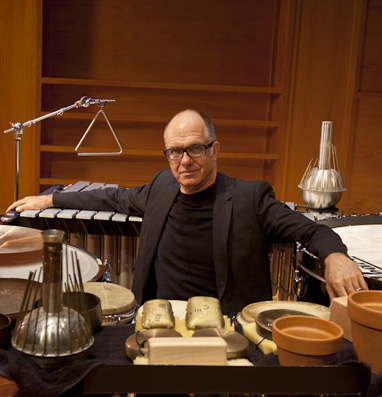
Percussionist, conductor, author, and 2015 Festival Music Director Steven Schick was born in Iowa and raised in a farming family. For forty years he has championed contemporary music by commissioning or premiering more than one hundred-fifty new works. He was the founding percussionist of the Bang on a Can All-Stars (1992-2002) and served as Artistic Director of the Centre International de Percussion de Genève (2000-2005). Schick is founder and Artistic Director of the percussion group, red fish blue fish.
Peter Sellars, music director
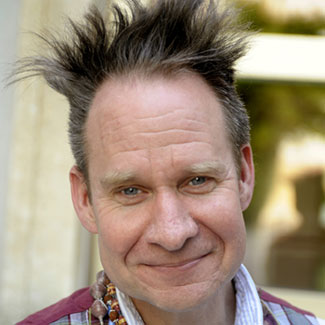
 Opera, theater, and festival director Peter Sellars has gained international renown for his groundbreaking and transformative interpretations of artistic masterpieces and for collaborative projects with an extraordinary range of creative artists. He has staged operas at the Dutch National Opera, English National Opera, Lyric Opera of Chicago, Opéra National de Paris, Salzburg Festival, and San Francisco Opera, among others, and has established a reputation for bringing 20th-century and contemporary operas to the stage, including works by Hindemith, Ligeti, Messiaen, and Stravinsky.
Opera, theater, and festival director Peter Sellars has gained international renown for his groundbreaking and transformative interpretations of artistic masterpieces and for collaborative projects with an extraordinary range of creative artists. He has staged operas at the Dutch National Opera, English National Opera, Lyric Opera of Chicago, Opéra National de Paris, Salzburg Festival, and San Francisco Opera, among others, and has established a reputation for bringing 20th-century and contemporary operas to the stage, including works by Hindemith, Ligeti, Messiaen, and Stravinsky.
Leila Adu, singer and composer
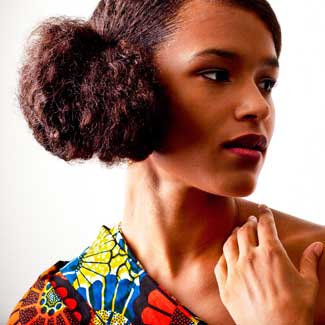
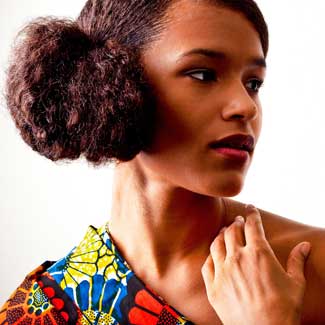
Leila Adu is a New Zealand composer of Ghanaian descent who has composed for the New Jersey Symphony Orchestra, the Brentano String Quartet, So Percussion, Gamelan Padhang Moncar, and Orchestra Wellington. Based in Brooklyn, she is currently a Princeton doctoral fellow and also teaches music to prisoners at Sing Sing Correctional Facility as a faculty member of Musicambia – music for social change.
Jean-Baptiste Barrière
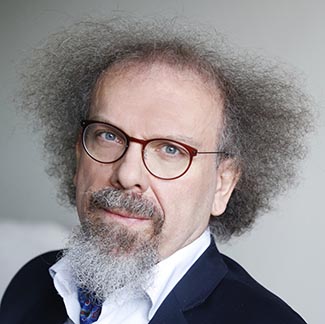
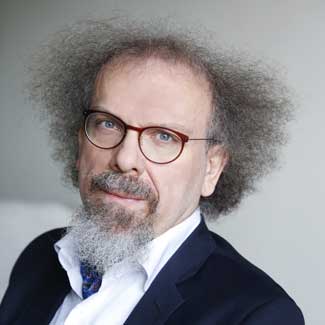 Jean-Baptiste Barrière was born in Paris in 1958. He has studied music, art history, philosophy, and mathematical logic. He made a career at IRCAM/Centre Georges Pompidou in Paris, where he started as a researcher in 1981, before becoming a director of musical research, education, and finally production. In 1998, he left IRCAM to concentrate on his own composition and multimedia projects.
Jean-Baptiste Barrière was born in Paris in 1958. He has studied music, art history, philosophy, and mathematical logic. He made a career at IRCAM/Centre Georges Pompidou in Paris, where he started as a researcher in 1981, before becoming a director of musical research, education, and finally production. In 1998, he left IRCAM to concentrate on his own composition and multimedia projects.
